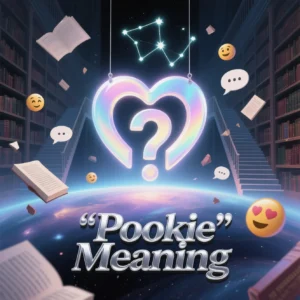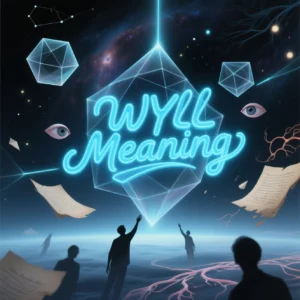Have you ever seen “IIRC” pop up in a text, tweet, or gaming chat and wondered what it means? This tiny acronym is everywhere—slipping into casual texts, Reddit threads, and even workplace chats. IIRC stands for “If I Recall Correctly” and is used to express a memory or assumption with a hint of uncertainty. It’s a quick way to share a thought while admitting you might not have all the facts.
In today’s fast-paced digital world, understanding slang like IIRC is key to keeping up with conversations, whether you’re gaming, scrolling social media, or texting friends. Knowing its meaning helps you avoid confusion and respond naturally. This blog dives deep into IIRC—its origins, uses, and nuances—so you can use it confidently and understand its role in modern communication.
Definition & Meaning
IIRC means “If I Recall Correctly” or sometimes “If I Remember Correctly.”** It’s a shorthand used to preface a statement when someone is sharing something from memory but isn’t 100% sure it’s accurate. It’s like saying, “I think this is right, but don’t quote me.” The phrase softens a statement, making it less assertive and more conversational.
Examples of IIRC in Use:
- Texting: “IIRC, the party starts at 8, but check with Sarah.”
- Social Media: “IIRC, that movie came out in 2019, right?
- Gaming: “IIRC, you need 500 points to unlock that skin.”
In each case, IIRC signals that the speaker is relying on memory and leaves room for correction. It’s polite, casual, and perfect for situations where you want to contribute without sounding overly confident or risking being wrong.
Background & History
The term IIRC emerged in the early days of the internet, particularly in chat rooms and forums like IRC (Internet Relay Chat) in the 1990s. Acronyms became popular as users sought to type faster in real-time conversations. IIRC likely stemmed from the need to qualify statements in text-based discussions where fact-checking wasn’t instant. Over time, it spread from niche online communities to mainstream platforms like Twitter, Reddit, and Discord.
By the 2000s, IIRC was common in blogs, forums, and early social media. Its use exploded with the rise of texting and instant messaging, where brevity is king. Today, it’s a staple in digital communication, especially among tech-savvy groups, gamers, and younger generations. While it started in English-speaking online spaces, its simplicity has made it recognizable globally, even in non-English contexts where internet slang often crosses borders.
Usage in Various Contexts
IIRC is versatile, fitting into many settings. Here’s how it’s used across different platforms:
Texting
In texts, IIRC keeps things light and informal. It’s often used to share plans or facts without committing fully.
- Example:
- Alex: “Hey, IIRC, we’re meeting at the café at 6?”
- Jamie: “Yeah, 6 works! I’ll confirm.”
Social Media
On platforms like Twitter or Reddit, IIRC is common in threads where users share opinions or facts from memory.
- Example:
- User1: “IIRC, that band broke up last year.”
- User2: “Nah, they’re still touring! Check their site.”
Gaming
In gaming chats, IIRC helps players share tips or strategies without sounding like know-it-alls.
- Example:
- Player1: “IIRC, the boss spawns after 3 waves.”
- Player2: “Good call, let’s prep for it.”
Casual Conversations
In face-to-face talks, IIRC is less common but might slip into nerdy or tech-heavy discussions.
- Example:
- Friend: “IIRC, that pizza place has vegan options.”
- You: “Cool, let’s try it!”
Common Misconceptions & Clarifications
Some people confuse IIRC with similar acronyms like IMO (In My Opinion) or AFAIK (As Far As I Know). IIRC specifically relates to memory, not opinions or general knowledge. Another misconception is that IIRC is overly formal or outdated, but it’s still widely used in casual digital spaces.
In rare cases, IIRC might be seen as dismissive or uncertain in serious discussions. For example, saying “IIRC, the deadline is tomorrow” in a work email could seem unprofessional. Context matters—use IIRC only when uncertainty is okay. There’s no offensive meaning to IIRC, but overusing it might make you sound unsure or flaky.
Similar Terms & Alternatives
IIRC isn’t the only way to express uncertainty. Here are related terms:
- AFAIK (As Far As I Know): Suggests general knowledge, not just memory.
- IIUC (If I Understand Correctly): Used to confirm understanding, not recall.
- TBH (To Be Honest): Shares an opinion or feeling, not a fact.
- IMO (In My Opinion): Expresses a personal view, not a memory.
Comparison Table
| Term | Meaning | Example |
|---|---|---|
| IIRC | If I Recall Correctly | “IIRC, the event is at 7.” |
| AFAIK | As Far As I Know | “AFAIK, it’s sold out.” |
| IIUC | If I Understand Correctly | “IIUC, you want it by Friday?” |
| IMO | In My Opinion | “IMO, this game is awesome.” |
How to Respond to IIRC
Responding to IIRC depends on the vibe you’re going for. Here are some styles:
Casual
Keep it chill and confirm or correct.
- Example:
- Friend: “IIRC, the movie’s at 9.”
- You: “Yup, 9 it is!”
Funny
Add humor to lighten the mood.
- Example:
- Friend: “IIRC, you owe me $5.”
- You: “Your memory’s wild, buddy—I paid you last week!”
Professional
Stay polite and clear, especially in work settings.
- Example:
- Colleague: “IIRC, the report’s due tomorrow.”
- You: “Thanks for the heads-up. It’s actually due Friday.”
Privacy-Conscious
If the topic’s sensitive, deflect politely.
- Example:
- Friend: “IIRC, you’re free this weekend?”
- You: “Hmm, I’ll let you know my plans later.”
Regional or Cultural Differences
IIRC is primarily an English-language term, rooted in internet culture. It’s most common in English-speaking countries like the US, UK, Canada, and Australia. In non-English regions, similar phrases exist, like “si no me equivoco” in Spanish (meaning “if I’m not mistaken”). In multilingual online spaces, IIRC is often understood due to the global spread of internet slang.
Some cultures prefer more direct language, so IIRC’s hedging might feel unnecessary. For example, in high-context cultures like Japan, stating uncertainty might be implied through tone rather than acronyms. Regional slang varies, but IIRC’s simplicity makes it universally recognizable online.
Comparison with Similar Terms
Here’s a deeper comparison of IIRC with similar expressions:
- IIRC vs. AFAIK: IIRC is memory-specific, while AFAIK covers general knowledge. Use IIRC for past events, AFAIK for broader facts.
- IIRC vs. IIUC: IIRC is about recalling facts; IIUC is about confirming understanding. IIUC fits better in discussions requiring clarification.
- IIRC vs. IMO: IMO is subjective, while IIRC is about factual recall, even if uncertain.
Quick Comparison List
- IIRC: “IIRC, we met in 2020.” (Memory-based, factual.)
- AFAIK: “AFAIK, the store’s open till 10.” (General knowledge.)
- IIUC: “IIUC, you’re suggesting a new plan?” (Understanding check.)
- IMO: “IMO, this is the best café.” (Opinion-based.)
Usage in Online Communities & Dating Apps
IIRC thrives in online spaces like Reddit, Discord, and Twitter, where users share quick thoughts or facts. On dating apps like Tinder, it’s less common but might appear in playful or nerdy chats.
- Example on Tinder:
- Match: “IIRC, you said you love sci-fi?”
- You: “Good memory! Yeah, I’m a huge Star Wars fan.”
Tips for Responding
- Be playful: Match the casual tone with a fun reply.
- Confirm or correct: If they’re wrong, gently clarify.
- Keep it light: Avoid heavy topics when IIRC is used—it’s usually a casual cue.
In gaming communities, IIRC often appears in strategy discussions or lore debates on Discord or Twitch. It’s a way to share knowledge without sounding bossy.
Hidden or Offensive Meanings
IIRC has no hidden or offensive meanings. It’s a neutral acronym focused on memory. However, tone and context matter. Using IIRC in a serious or sensitive situation (e.g., “IIRC, your presentation failed”) could come off as flippant or rude. Always match the tone to the conversation’s vibe. In rare cases, overusing IIRC might make you seem uncertain or uncommitted, which could annoy others in professional or decisive settings.
Suitability for Professional Communication
IIRC is generally not suitable for formal communication. In emails or reports, it can seem too casual or suggest uncertainty, which might undermine confidence. Instead, use phrases like:
- “Based on my recollection”
- “To the best of my knowledge”
- “As I understand it”
Example
- Unprofessional: “IIRC, the client meeting is next week.”
- Professional: “To my knowledge, the client meeting is scheduled for next week.”
In informal work chats, like Slack, IIRC might be fine among colleagues who use casual language. When in doubt, opt for clearer, more formal alternatives in professional settings.
FAQs
- What does IIRC stand for?
It means “If I Recall Correctly” or “If I Remember Correctly.” - Is IIRC formal or informal?
It’s informal, best for casual texts, social media, or gaming chats. - Can IIRC be offensive?
No, it’s neutral, but using it in serious contexts might seem flippant. - How do I respond to IIRC?
Confirm, correct, or reply playfully, depending on the context. - Is IIRC used globally?
It’s mainly English-based but understood in global online communities. - What’s a professional alternative to IIRC?
Try “Based on my recollection” or “To my knowledge.” - Does IIRC have different meanings?
No, it’s consistently about recalling something with slight uncertainty.
Conclusion
IIRC is a handy acronym that adds a touch of humility to digital conversations. Whether you’re texting friends, debating game strategies, or posting on Reddit, it’s a quick way to share what you think you know while leaving room for correction. Understanding IIRC helps you navigate casual chats with ease. From its roots in 1990s internet forums to its widespread use today, IIRC remains a staple of online slang. Just remember to avoid it in formal settings and match your response to the context—casual, funny, or professional. Now that you’re in the know, you can use IIRC confidently or impress your friends by decoding it in the next group chat!



